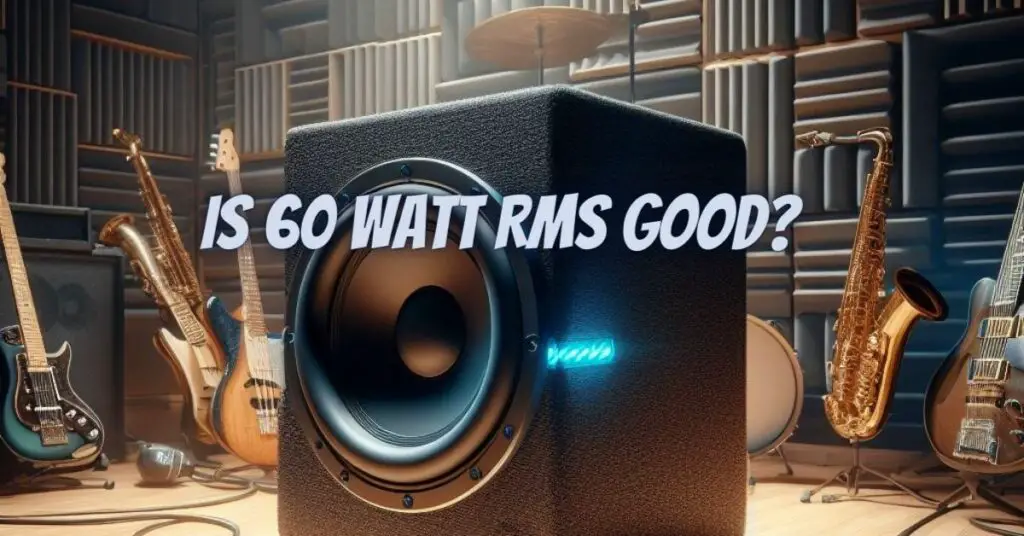When it comes to evaluating audio equipment, the question of whether a 60-watt RMS (Root Mean Square) power rating is considered good is a common one. RMS power is a crucial metric in assessing the performance and capabilities of audio components, such as amplifiers and speakers. In this comprehensive article, we will delve into the significance of a 60-watt RMS rating, explore its suitability for various audio applications, and provide insights to help you determine if it’s a good fit for your audio system.
Understanding RMS Power
Before diving into the evaluation of a 60-watt RMS rating, it’s essential to have a clear understanding of what RMS power signifies:
- RMS Power (Root Mean Square): RMS power represents the continuous or sustained power output of an audio component over an extended period. It is a measurement of the amount of power the equipment can deliver without distortion or damage.
- Peak Power: In contrast to RMS power, peak power denotes the maximum instantaneous power an audio component can produce for very short bursts. Peak power is not a reliable indicator of continuous power handling and does not accurately reflect real-world performance.
Is 60 Watt RMS Good?
Whether a 60-watt RMS rating is considered good depends on various factors, including the specific application, listening preferences, and the components with which it is paired. Here are some considerations to help you assess whether 60 watts RMS is suitable for your audio needs:
- Speaker Sensitivity: The sensitivity of your speakers plays a significant role in determining whether 60 watts RMS is sufficient. High-sensitivity speakers can produce ample volume and sound detail with less power, making them well-suited for lower RMS wattage sources.
- Listening Environment: The size and acoustics of your listening space are essential considerations. A smaller room may require less RMS power to achieve desired volume levels, while larger spaces may benefit from higher wattage.
- Listening Preferences: Personal listening preferences are crucial. If you enjoy high-volume listening with dynamic audio, you may require more RMS power to accommodate your preferences.
- Music Genre: The type of music you primarily listen to can influence your RMS power requirements. Music genres with heavy bass and dynamic range may benefit from more power to reproduce complex soundscapes accurately.
- Component Quality: The quality of your audio components, such as amplifiers and speakers, plays a significant role in overall sound quality. High-quality components can often deliver superior performance even at lower RMS power ratings.
- Room Acoustics: Consider the acoustics of your listening environment. Proper room treatment and placement of components can enhance sound quality and perception.
Is 60 Watt RMS Suitable for You?
To determine if 60 watts RMS is suitable for your audio system, follow these steps:
- Evaluate Speaker Sensitivity: Check the sensitivity rating of your speakers. High-sensitivity speakers can achieve higher volumes with less power.
- Assess Room Size: Consider the size and acoustics of your listening space. Smaller rooms may require less power, while larger rooms may benefit from more.
- Consider Listening Preferences: Think about your typical listening habits and whether you prioritize volume, clarity, or a balance of both.
- Quality of Components: Assess the quality of your audio components. High-quality equipment can often deliver better performance at lower power levels.
- Sound Quality: Prioritize sound quality over raw power. A well-matched, high-quality system can provide a more satisfying listening experience at 60 watts RMS than a poorly matched, high-wattage system.
A 60-watt RMS rating can be more than sufficient for many audio applications, depending on your specific needs and preferences. The suitability of this power rating depends on factors such as speaker sensitivity, room size, listening preferences, component quality, and room acoustics. Rather than fixating solely on the wattage number, focus on creating a balanced and well-matched audio system that aligns with your goals for sound quality and volume. With the right components and setup, 60 watts RMS can deliver an enjoyable and satisfying listening experience for a wide range of audio enthusiasts.


